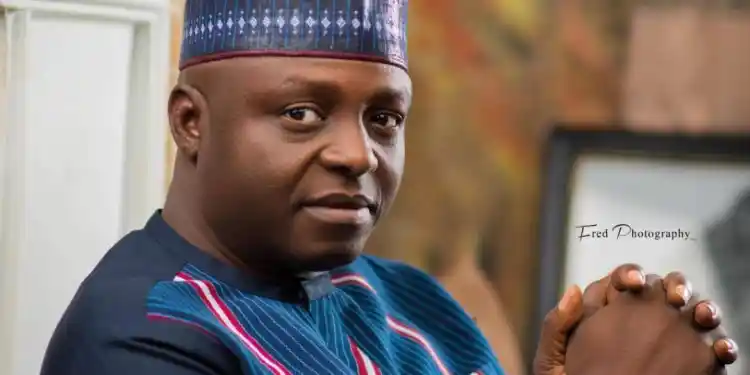By Martha Maimako (Mrs)
“Power is not an end in itself; it is a means to maintain order and shape destiny.” — Harold Lasswell
The political chessboard in Plateau State is on the verge of a dramatic twist with strong indications that Professor Nentawe Goshwe Yilwatda will soon emerge as the National Chairman of the All Progressives Congress. While the formal announcement has not yet been made, the near certainty of his ascension has already sent ripples across the state’s political landscape. It is more than an internal party adjustment; it promises to be a power-shifting earthquake with far-reaching consequences for Plateau politics.
Once this development becomes official, the equation of power in Plateau will change fundamentally and the implications will test the resilience of alliances, loyalties and ambitions that have defined the state’s politics for decades.
First, the looming elevation heaps an enormous burden on the Peoples Democratic Party in Plateau State and particularly on Governor Caleb Mutfwang. For a party already grappling with internal contradictions, legal battles and a governance image problem, the rise of Nentawe to the APC’s apex position would transform the opposition into a much stronger force. The stakes have never been higher for Governor Mutfwang, whose comfort zone may soon vanish. APC, energized by this breakthrough, could streamline its gubernatorial calculations to Mangu Local Government Area. By doing so, the next electoral battle becomes not just competitive but intensely personal, taking the fight directly to the Governor’s backyard.
Secondly, Nentawe’s expected elevation will free up the ministerial slot he currently occupies at the Ministry of Humanitarian Affairs and Poverty Reduction. While some may view this as a setback, it actually presents an opportunity for Plateau APC leaders to correct the longstanding imbalance that has disadvantaged the Northern Zone. For years, strategic federal appointments have tilted toward the Central and Southern Zones. If Nentawe moves up, it opens a chance to nominate a candidate from the North, particularly from the Berom extraction, restoring confidence and balancing internal equity within the party.
However, politics is never without its paradoxes. Distinguished Senator Simon Bako Lalong, the immediate past Governor of Plateau and the undisputed leader of the APC in the state, will face a delicate scenario. Known for his consensus-driven style, Lalong has historically avoided needless confrontations and does not lust for power. But leadership instincts are shaped by circumstance. Will Nentawe, buoyed by the authority of his anticipated national office, defer to his mentor and allow Lalong to retain leadership of the party in the state? Or will the allure of power tempt him to redraw the leadership hierarchy, forcing Lalong into the background? This is more than a personality question; it is a litmus test for loyalty, tact, and political maturity.
In this mix lies another sensitive subplot — the rumored plan of Governor Caleb Mutfwang to defect to the APC. If this ambition ever existed, it will die a natural death the moment Nentawe assumes the chairmanship. At that point, the APC will have no compelling need for Mutfwang. In fact, even before this development, many insiders argue that the party never really had any need for him. The emergence of a Plateau-born National Chairman will consolidate internal structures and strengthen alliances in such a way that Mutfwang’s political relevance within APC becomes practically nonexistent.
Caught in the shadows of this reconfiguration is Barrister Festus Fuanter, the current Deputy National Secretary of the APC and a member of both the National Working Committee and the National Executive Committee. His future suddenly hangs in the balance. Political arithmetic rarely accommodates two heavyweights from the same state holding strategic national positions in the same party structure. If precedent holds, one may have to give way. Fuanter’s possible exit would be a classic case of collateral damage in this emerging political order.
It is important to clarify another point: while Nentawe’s expected resignation from the federal cabinet is inevitable, Plateau State cannot be entirely excluded from the Federal Executive Council. The Constitution mandates that every state must have at least one representative in the FEC. What is uncertain is the weight of the portfolio Plateau will retain. There are no guarantees it will remain at the level of the Ministry of Humanitarian Affairs or even as a senior ministerial position. The state may end up with a Minister of State in a less strategic ministry, thereby reducing its leverage but not eliminating its representation.
The anticipated emergence of Nentawe as APC’s National Chairman has seismic implications for the 2027 elections. If the APC capitalizes on this momentum, consolidates internal harmony and leverages federal goodwill through it’s most visible sons like Sen. Lalong, Hon. Wase, Hon. Gagdi, Barr. Fuanter, Dr. Tsenyil etc, it could mount the most formidable challenge yet to PDP’s control of Plateau. With a Plateau son at the helm of the ruling party nationally, APC will likely prioritize the state as a symbolic battleground for reclaiming lost ground. This could translate into strategic funding, technical support and a reinvigorated party structure capable of overturning PDP’s hold.
Should APC present a governorship candidate from Mangu, the contest will become intensely personal for Governor Caleb Mutfwang, who would be forced to defend his record under the pressure of home-based rivalry. For the PDP, this is a nightmare scenario, especially with internal divisions still festering.
Yet, success for APC is not automatic. Internal unity will be critical. If the relationship between Nentawe and Lalong and the others sours or perceived arrogance alienates stakeholders, the opposition could implode under the weight of its own ambition. Conversely, if PDP stabilizes, delivers tangible governance outcomes and exploits incumbency power effectively, it may still hold the state.
Ultimately, Plateau’s political future has entered uncharted waters. Professor Nentawe’s expected rise is more than the advancement of an individual; it is a transformative moment that will redefine relationships, recalibrate strategies and reshape governance in the state.
If Nentawe and Lalong play this game with wisdom and humility, Plateau could become APC’s strongest fortress in the North Central by 2027, setting the stage for one of the fiercest electoral contests in its history.


